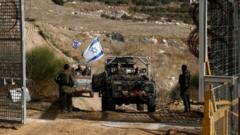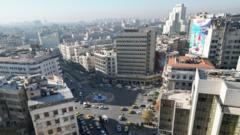Prime Minister Netanyahu has announced plans to increase the population of Israeli settlements in the Golan Heights. This move comes on the heels of a significant shift in Syria's political landscape after the fall of Bashar al-Assad, igniting debates over legality and security in the region.
Israel's Golan Heights Expansion Amidst Shifting Syrian Control

Israel's Golan Heights Expansion Amidst Shifting Syrian Control
Israel's government greenlights a settlement expansion in the Golan Heights following the regime change in Syria, raising international concerns about legality and regional tensions.
Israel's government has made the controversial decision to expand settlements in the Golan Heights, a move Prime Minister Benjamin Netanyahu attributes to the emergence of a "new front" following the destabilization of Syria after the fall of Assad’s regime. This expansion aims to double the population in a territory seized in the 1967 Six-Day War, which is largely recognized as illegally occupied under international law.
Netanyahu has asserted that the recent political upheaval in Syria necessitated this expansion to fortify Israel's security along its borders. In action aligning with this assertion, Israeli forces have encroached into a buffer zone separating the Golan Heights from Syria, claiming that the changes in Damascus have led to the collapse of previous ceasefire agreements.
There are currently over 30 Israeli settlements in the Golan Heights that shelter around 20,000 residents. These settlements exist alongside an equal number of Syrian inhabitants, predominantly from the Druze community, who opted to remain following the Israeli occupation. The Israeli government, however, continues to dispute the illegality of these settlements.
Following this announcement, Syrian leadership has criticized ongoing Israeli airstrikes targeting military sites across Syria, with newly appointed leader Ahmed al-Sharaa emphasizing the urgent need to stabilize the region. He has cautioned against escalating tensions but maintains that Syria is not inclined towards conflict with its neighbors despite enduring several years of warfare.
Previously, the Israeli Defense Forces (IDF) have justified their actions against potential threats, especially concerning the risk of weapons falling into the hands of extremist factions. The IDF's air campaign has reportedly seen over 450 strikes since December, underscoring the heightened military tensions in the region.
In the wake of shifts in Syrian authority, international responses have varied, with the U.S Secretary of State indicating engagement with the now-reforming leadership under the Islamist group Hayat Tahrir al-Sham (HTS), which complicates the power dynamics in the region further. Amidst these tumultuous developments, UN envoy Geir Pedersen has expressed hopes for lifting sanctions to assist in Syria’s recovery.
Meanwhile, Turkey's Defense Minister has signaled readiness to extend military support to the new Syrian government, emphasizing the importance of stability through constructive engagement.
As the situation evolves, the risks associated with Israel's settlement expansion and Syria's governance continue to shape regional discourse, revealing layers of complexity that require careful navigation to avoid further escalation.
Netanyahu has asserted that the recent political upheaval in Syria necessitated this expansion to fortify Israel's security along its borders. In action aligning with this assertion, Israeli forces have encroached into a buffer zone separating the Golan Heights from Syria, claiming that the changes in Damascus have led to the collapse of previous ceasefire agreements.
There are currently over 30 Israeli settlements in the Golan Heights that shelter around 20,000 residents. These settlements exist alongside an equal number of Syrian inhabitants, predominantly from the Druze community, who opted to remain following the Israeli occupation. The Israeli government, however, continues to dispute the illegality of these settlements.
Following this announcement, Syrian leadership has criticized ongoing Israeli airstrikes targeting military sites across Syria, with newly appointed leader Ahmed al-Sharaa emphasizing the urgent need to stabilize the region. He has cautioned against escalating tensions but maintains that Syria is not inclined towards conflict with its neighbors despite enduring several years of warfare.
Previously, the Israeli Defense Forces (IDF) have justified their actions against potential threats, especially concerning the risk of weapons falling into the hands of extremist factions. The IDF's air campaign has reportedly seen over 450 strikes since December, underscoring the heightened military tensions in the region.
In the wake of shifts in Syrian authority, international responses have varied, with the U.S Secretary of State indicating engagement with the now-reforming leadership under the Islamist group Hayat Tahrir al-Sham (HTS), which complicates the power dynamics in the region further. Amidst these tumultuous developments, UN envoy Geir Pedersen has expressed hopes for lifting sanctions to assist in Syria’s recovery.
Meanwhile, Turkey's Defense Minister has signaled readiness to extend military support to the new Syrian government, emphasizing the importance of stability through constructive engagement.
As the situation evolves, the risks associated with Israel's settlement expansion and Syria's governance continue to shape regional discourse, revealing layers of complexity that require careful navigation to avoid further escalation.




















